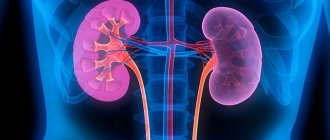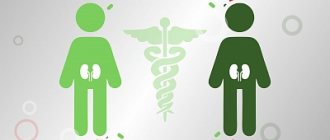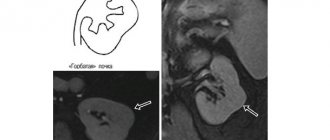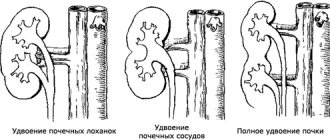Why does a person have one kidney missing?
There are several such reasons:
- absent since birth;
- developmental anomaly when it is in its infancy;
- loss due to certain circumstances (for example, injury or donation);
- loss as a result of surgery - nephrectomy.
Life with one kidney is possible, and many examples are proof of this. After all, a person can achieve a lot of success in work, sports, and personal life even with such a defect. However, after a nephrectomy for any urological disease, the patient’s life changes.
Indications for use
Laparoscopic nephrectomy is indicated for kidney cancer when the tumor reaches a large size or there is evidence of its spread to the vessels and elements of the pyelocaliceal system. The operation helps save the lives of patients in the later stages of cancer.
There may be other reasons for organ removal:
- Polycystic disease, developmental anomalies, lesions with purulent complications.
- Injury to an organ followed by rupture.
- A long-term chronic illness that caused the appearance of a shriveled kidney.
What to do if a person has only one working kidney
If a person has one kidney from birth or after surgery, the remaining organ will take over the functions of the lost one. The remaining bud will grow slightly faster. As a result, it will become almost the same size as two healthy organs.
Thus, compensatory mechanisms occur in the body. The release of metabolic products will occur in the same volume as in a healthy person. Thus, he can live fully with one organ, and pathological processes will not occur in the body.
A little about the procedure itself
Kidney nephrectomy is an operation to remove the affected organ. It is removed through a small incision in the skin or using laparoscopy. The first method provides good access to the kidney and neighboring organs, but leaves a painful suture and increases the rehabilitation period.
After laparoscopy, a small suture remains on the patient’s body, the diameter of which does not exceed 2 cm. The risk of bleeding and injury to internal organs is reduced, so recovery is much faster and painless.
Both types of surgery are performed under general anesthesia. The patient is placed on his side and secured on the operating table with elastic bandages.
Life after nephrectomy
If your doctor recommends removing a kidney for any reason, do not panic. Usually the postoperative period proceeds without complications. In such cases, a person can live a full life. However, he will have to adhere to some restrictions.
Immediately after the operation, the patient is prescribed bed rest. Food should be gentle. The further period of adaptation is associated with compensatory mechanisms in the body. At the same time, the kidney increases slightly in volume. This process is accompanied by mild pain, which soon passes.
After nephrectomy, the patient must:
- adhere to gentle physical activity;
- harden.
The diet should be high in calories and consist of easily digestible foods. The diet should be based on:
- vegetable and fruit dishes;
- bread made from rye flour;
- dairy products;
- low-fat meat and fish dishes.
It is necessary to exclude fried, smoked, as well as canned food and marinades. It is necessary to observe the drinking regime. It is impossible to sharply limit the amount of liquid and salt, as this will cause harm.
Preventive measures after surgery are simple:
- prevention and treatment of infectious diseases;
- treatment of chronic diseases;
- avoiding hypothermia;
- visit a urologist to monitor the condition of the remaining kidney.
In general, life with one kidney is not much different from the life of other people. Young women should not worry about having a child: this is completely acceptable. Although when examining the expectant mother, the doctor takes into account various individual cases.
Life with half a kidney: is it possible?
The next operation, which, without a doubt, will go down in the history of domestic oncourology, was carried out at the A.V. Vishnevsky National Medical Research Center for Surgery. Here we performed extracorporeal resection of a single kidney affected by cancer with tumor thrombosis of the inferior vena cava.
A man was admitted to the Center with a diagnosis of kidney cancer, whose situation was complicated by the fact that it was his only kidney: he, as a military man, lost his second several years ago as a result of a combat wound.
The tumor affected exactly half of the kidney and extended into the inferior vena cava, but the venous lines coming from the healthy half of the kidney and sufficient for the normal functioning of the organ remained unaffected by the disease. This allowed the surgeons of the Vishnevsky Center to take not the simple route of removing the entire kidney at once and sending the patient to long-term chronic hemodialysis, but to try to remove only the tumor and blood clot, while preserving half the organ.
The operating team included the leading specialists of the Center - vascular surgeon, Doctor of Medical Sciences Andrey Evgenievich Zotikov, oncourologist, Doctor of Medical Sciences Alexander Aleksandrovich Teplov, oncourologist, Candidate of Medical Sciences Alexander Anatolyevich Gritskevich.
The picture of what was happening in the operating room looked like this: first, the surgeons removed the diseased kidney from the patient’s body, placed it in a special cooling solution, removed half of the organ affected by the tumor and at the same time removed the tumor thrombus from the inferior vena cava, while preserving the renal vein (which is, in principle, very rare who manages to do it). Then an equally difficult stage lay ahead - returning the organ to its place, when it was necessary to restore all the kidney vessels, down to the smallest ones, so that the kidney could begin to supply blood and function again. This, according to the experts themselves, is the “aerobatics” of vascular surgery.
To the delight of both the doctors and the patient, a few days after the operation the remaining half of the kidney “turned on.” Correct postoperative care of the patient played a huge role in this. According to the head of the department of anesthesiology and resuscitation of the National Medical Research Center named after. A.V. Vishnevsky, Doctor of Medical Sciences Georgy Pavlovich Plotnikov, postoperative management of patients after resection of a solitary kidney EX VIVO is a complex process. After all, it is difficult to predict how soon after such a major injury the kidney will recover and the patient will be able to recover from the state of anuria. The recovery process can be limited to 5-8 days, during which hemodialysis is required, or it can last for 4-5 weeks.
Currently, the unique patient is already at home, his condition is satisfactory.
— The work of one’s own kidney in the body, even if it is only half of it, is always better than an “artificial kidney,” that is, a person’s lifelong dependence on the hemodialysis procedure. Transplantation of a donor organ in such cases is not always possible. Our decision to undergo surgery was dictated precisely by these considerations and the desire to do the best possible for the patient,” explains oncourologist Alexander Anatolyevich Gritskevich.
In the entire history of modern medicine, no more than fifty such operations have been performed in the world. Of these, even fewer are successful.
— As in other countries, in Russia extracorporeal resections of a solitary kidney are performed only in a few medical centers, since these are operations associated with great technical difficulties, and most importantly, they are incredibly labor-intensive. Not only very highly professional and courageous people, but real devotees, including my colleagues, are able to engage in oncology surgery in this version,” says the director of the National Medical Research Center for Surgery named after. A.V. Vishnevsky, Academician of the Russian Academy of Sciences Amiran Shotaevich Revishvili.
Possible complications after surgery
Sometimes, in the long term, patients with one kidney have some risk of complications. First of all, this is a dysfunction of the organ, especially if the remaining kidney had a pathology. Such patients need to monitor their blood pressure, as there are chances of developing hypertension, changes in urine, and their sensations.
However, if you follow the doctor’s recommendations, you can achieve a lasting recovery: patients, as a rule, do not experience any significant complications.
Indications for kidney removal
Indications for nephrectomy may include various kidney pathologies. Surgery is offered to the patient when the function or anatomical integrity of an organ is lost to restoration. These conditions include:
- Oncological process in the kidney;
- Severe urolithiasis;
- Polycystic disease;
- Kidney prolapse;
- Closed kidney injuries;
- Gunshot or knife wounds, with damage to organ tissue.
Lifestyle with chronic kidney failure
The life of a patient with the development of chronic renal failure (CRF) is more limited. Therapeutic measures are aimed at preserving the functions of the organ. They enable the patient to live as long as possible.
Patients with chronic renal failure need:
- do not use nephrotoxic drugs;
- limit table salt;
- limit the amount of proteins;
- eat fresh vegetables and fruits;
- increase the amount of fats and carbohydrates;
- exclude fried, smoked, pickled foods, as well as coffee, chocolate, tea.
The goal of treatment is to slow the rate of progression of the deficiency as much as possible. If conservative treatment is ineffective, active therapy is used. It consists of the following measures.
- Hemodialysis, or artificial blood purification through an artificial kidney apparatus.
- Peritoneal dialysis is the purification of blood by injecting a special fluid, which is then drained out.
- Healthy kidney transplant.
So, a person with one kidney can live an active life. It is limited only in cases of chronic renal failure. In such cases, the most effective treatment is transplantation.
Postoperative observation of the patient
The main goal of medical observation of a patient after nephrectomy is to assess the functioning of the remaining kidney. The patient, six months after the operation, should consult a urologist about a follow-up examination. It would be better if it was a specialized clinic, such as the Fronstein Urology Clinic of the First Moscow State Medical University named after I.M. Sechenov, the leading urological medical institution in our country. This is a multidisciplinary institution, with the latest equipment, including diagnostic equipment, on which urological examinations are carried out.
Pregnancy with one kidney
The absence of one kidney is not a death sentence. If it is one organ from birth, then the woman has the opportunity to become pregnant and bear a healthy baby without complications. Renal nephrons cope with increased load during gestation.
When one organ is removed due to a disease, when planning a pregnancy, you need to consult a urologist. Contraindications may include kidney disease or recent nephrectomy.
According to obstetricians and gynecologists, the absence of one organ does not provoke premature birth. A single kidney is not an indication for a cesarean section.
Is it possible to live with one kidney?
The question of whether it is possible to live without one kidney arises among people who have undergone a nephrectomy. The compensatory mechanism triggers the growth of renal structures, and after a few months, full filtration is restored.
The following will help you live a full life after nephrectomy:
- dietary food,
- rejection of bad habits,
- moderate physical activity,
- weight control,
- Regular screening to check kidney function.
It is recommended to constantly monitor the external indicators of urine. If the urine has changed color or there are impurities in it, then this is a reason to visit a urologist.









